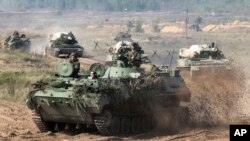Military officials in Belarus have sought to calm Western fears about major war games with Russia involving thousands of troops, tanks and aircraft, just hours before they are due to get underway.
The Zapad (West) 2017 maneuvers, mainly in Belarus this year, have caused concern at NATO and in neighboring countries. Some members of the alliance, including the Baltic states and Poland, have criticized a lack of transparency about the exercises and questioned Moscow's real intentions.
“We are not threatening anyone,” Oleg Voinov, an adviser to the Belarusian Defense Minister, told journalists Thursday. “We have chosen military bases that are significantly removed from the borders with Ukraine, Poland, Lithuania and Latvia.”
Russia-West relations have hit their lowest point since the Cold War following Moscow's 2014 annexation of Ukraine's Crimean Peninsula and continuing fighting between Russian-backed separatists and troops loyal to Kyiv in eastern Ukraine. Western worries about the planned maneuvers have ranged from allegations that Russia could use them to permanently deploy its forces to Belarus to fears of a surprise attack on the Baltics.
Poland's National Security Bureau head, Pawel Soloch, said Thursday that the exercises were a demonstration “of the Russian state's capacity to hold full-scale war action.”
“The degree of mobilization is really impressive,” Soloch said on private Radio Zet.
The war games are scheduled to kick-off Thursday evening.
Russia and Belarus have said the exercises, which last until September 20, will involve 5,500 Russian and 7,200 Belarusian troops. Russian military officials have said up to 70 aircraft and about 250 tanks, 200 artillery systems and 10 navy ships will also be involved.
Russia's Defense Ministry said Thursday that elite parachute units in several Russian cities had been placed on alert to be deployed during the exercises.
Organizers have invented three “aggressor countries” - Veishnoriya, Lubeniya and Vesbasriya - to whose attacks the Russian and Belarusian militaries will simulate a response. The Baltic States and Poland fear that these monikers are just poorly disguised terms for their own countries.
NATO Secretary-General Jens Stoltenberg told NATO troops in Estonia last week that the alliance will be closely monitoring the war games.
Despite assurances from Moscow, Russia's neighbors expect the drills to be much greater in scope than officially declared. Estonian Defense Minister Juri Luik has said that Moscow could deploy up to 100,000 troops.
There is also unease in Kyiv, and Ukraine is currently conducting its own military exercises, called “Unflinching Tenacity,” scheduled to end Friday.
The Zapad maneuvers have also been criticized by Belarusian opposition leaders, who say Russia could use the occasion to position a large, permanent contingent of troops in Belarus, leaving the country at the mercy of any armed confrontation involving Moscow.
The most recent Zapad exercises, which occur every few years, took place in 2013, just before Russia's 2014 annexation of Crimea. Russia had leased a naval base in Crimea from Ukraine prior to its seizure, and used troops deployed there to quickly take over the Black Sea peninsula.




